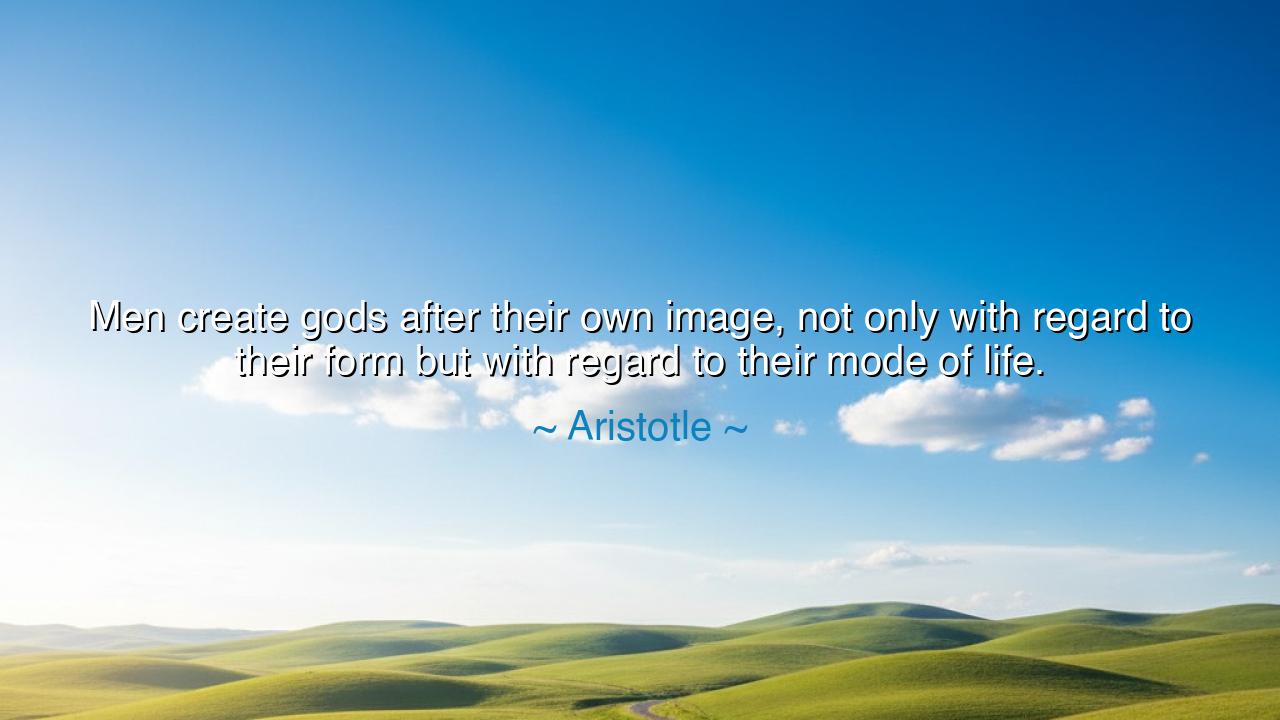
Men create gods after their own image, not only with regard to
Men create gods after their own image, not only with regard to their form but with regard to their mode of life.






Hear, O seekers of truth, the wisdom of Aristotle, who proclaimed: “Men create gods after their own image, not only with regard to their form but with regard to their mode of life.” These words unveil a mirror held up to humanity, showing that in its longing for the divine, mankind often projects its own desires, flaws, and virtues upon the heavens. The gods men worship, he teaches, are often reflections of themselves, clothed in immortal grandeur, yet born of mortal imagination.
The meaning is profound. When men gaze upon the mysteries of the universe, they are compelled to explain what they see. Out of fear, out of wonder, out of longing for order, they shape gods who resemble them—gods who eat, who drink, who rage, who love. Just as kings built palaces upon the earth, men imagined palaces in the sky, where gods sat enthroned in splendor. In this way, the divine became a projection of human form and human mode of life. To Aristotle, such gods reveal less about the cosmos than about the souls who worship them.
Consider the gods of Olympus, those mighty figures of Greek tradition. Zeus thundered with jealousy and wrath, Hera burned with vengeance, Ares reveled in war, Aphrodite delighted in desire. These were not beings beyond human passion, but embodiments of passion itself. They were the Greeks magnified, their virtues exalted, their vices immortalized. So too in other cultures: the Norse gods loved feasting and battle as their people did, while the Egyptian deities mirrored the cycles of the Nile and the order of their society. Always, the divine image bore the imprint of the mortal maker.
Yet history also gives us moments when this mirror was shattered. The Hebrew prophets declared a God unlike man—one who could not be carved in stone nor contained in temples. Their vision was not of gods born in man’s likeness, but of a divine will that transcended human frailty. And in the East, the Buddha spoke of liberation beyond gods, of an awakening that revealed the impermanence of all forms. These examples remind us that while Aristotle’s observation holds true for much of mankind, there are times when the human spirit strives not to create gods in its image, but to rise toward what surpasses it.
Still, Aristotle’s words endure as a warning. For even now, in ages of science and progress, men create new gods—idols of wealth, fame, power, and technology. They do not call them divine, yet they bow before them, shaping their lives around their demands. And these idols too bear man’s image, reflecting his greed, his pride, his hunger for control. To worship them is to be enslaved by the very shadows we cast upon the world.
The lesson, O listener, is this: be wary of the gods you serve, for they may be no more than your own reflection. Ask yourself—does your vision of the divine lift you beyond yourself, or does it merely confirm your desires? Do you worship truth, or do you worship a mirror? True wisdom seeks not gods who are convenient imitations of men, but realities that call men to rise above their limitations.
Therefore, take practical steps: examine your beliefs, your idols, your guiding ideals. If they demand only what pleases you, they are but your own creation. But if they challenge you, humble you, and beckon you toward higher virtue, then they are worthy. Seek always that which draws you beyond your own mode of life, and you will walk the path not of shadows, but of light.






AAdministratorAdministrator
Welcome, honored guests. Please leave a comment, we will respond soon